BUICK REGAL 1998 Owners Manual
Manufacturer: BUICK, Model Year: 1998, Model line: REGAL, Model: BUICK REGAL 1998Pages: 388, PDF Size: 20.19 MB
Page 251 of 388
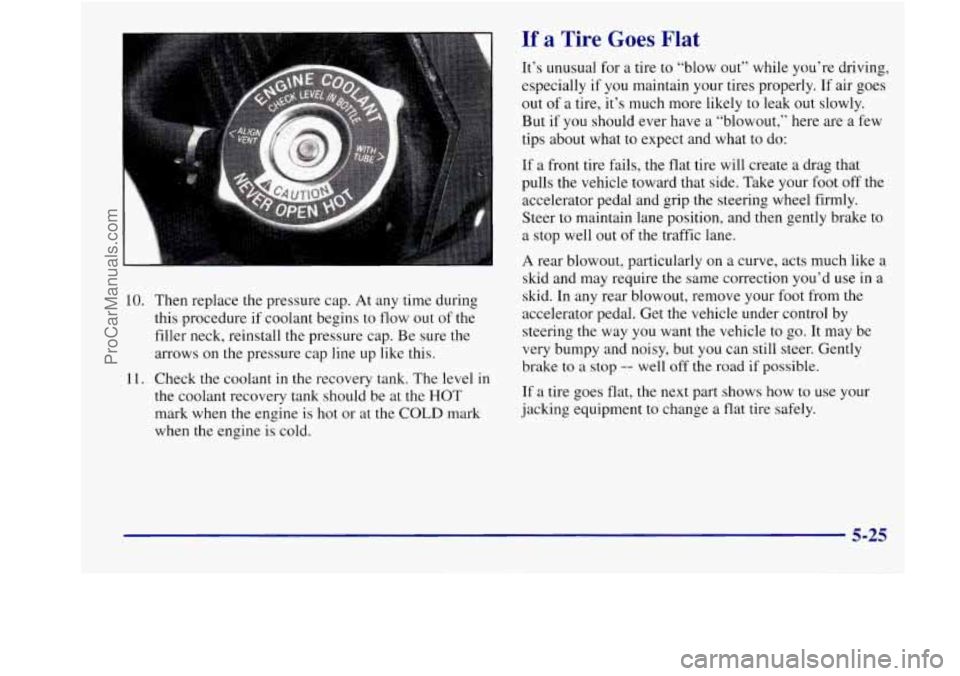
If a Tire Goes Flat
10. Then replace the pressure cap. At any time during
this procedure
if coolant begins to flow out of the
filler neck, reinstall the pressure cap. Be sure the
arrows on the pressure cap line
up like this.
11. Check the coolant in the recovery tank. The level in
the coolant recovery tank should be at the HOT
mark when the engine is hot or at the COLD mark
when the engine is cold. It’s
unusual for a tire
to “blow out” while you’re driving,
especially
if you maintain your tires properly. If air goes
out of a tire, it’s much more likely to leak out slowly.
But if you should ever have
a “blowout,” here are a few
tips about what to expect and what to do:
If a front tire fails, the flat tire will create a drag that
pulls the vehicle toward that side. Take your foot off
the
accelerator pedal and grip the steering wheel firmly.
Steer to maintain lane position, and then gently brake to
a stop well out of the traffic lane.
A rear blowout, particularly on a curve, acts much like a
skid and may require the same correction you’d use in a
skid. In any rear blowout, remove your foot from the
accelerator pedal. Get the vehicle under control by
steering
the way you want the vehicle to go. It may be
very bumpy and noisy, but you can still steer. Gently
brake
to a stop -- well off the road if possible.
If
a tire goes flat, the next part shows how to use your
jacking equipment to change a flat tire safely.
5-25
ProCarManuals.com
Page 252 of 388
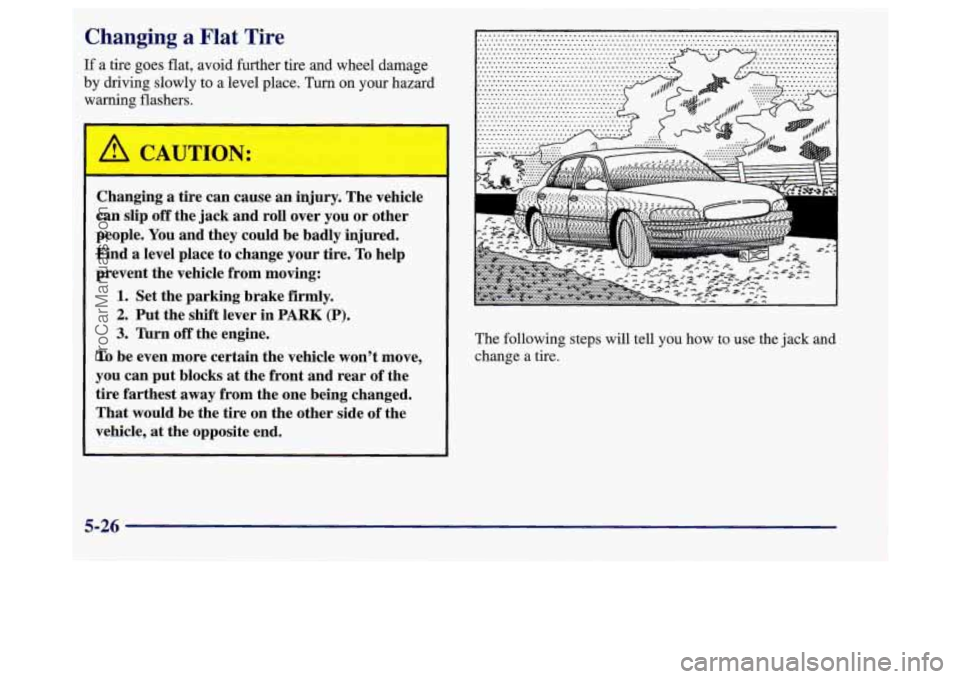
Changing a Flat Tire
If a tire goes flat, avoid further tire and wheel damage
by driving slowly to a level place. Turn on your hazard
warning flashers.
Changing a tire can cause an injury. The vehicle
can slip off the jack and roll over you or other
people. You and they could be badly injured.
Find a level place to change your tire. To help
prevent the vehicle from moving:
1. Set the parking brake firmly.
2. Put the shift lever in PARK (P).
3. Wrn off the engine.
To be even more certain the vehicle won't move,
you can put blocks at the front and rear of the
tire farthest away from the one being changed.
That would be the tire on the other side
of the
vehicle, at the opposite end.
The following steps will tell you how to use the jack and
change a tire.
5-26
ProCarManuals.com
Page 253 of 388
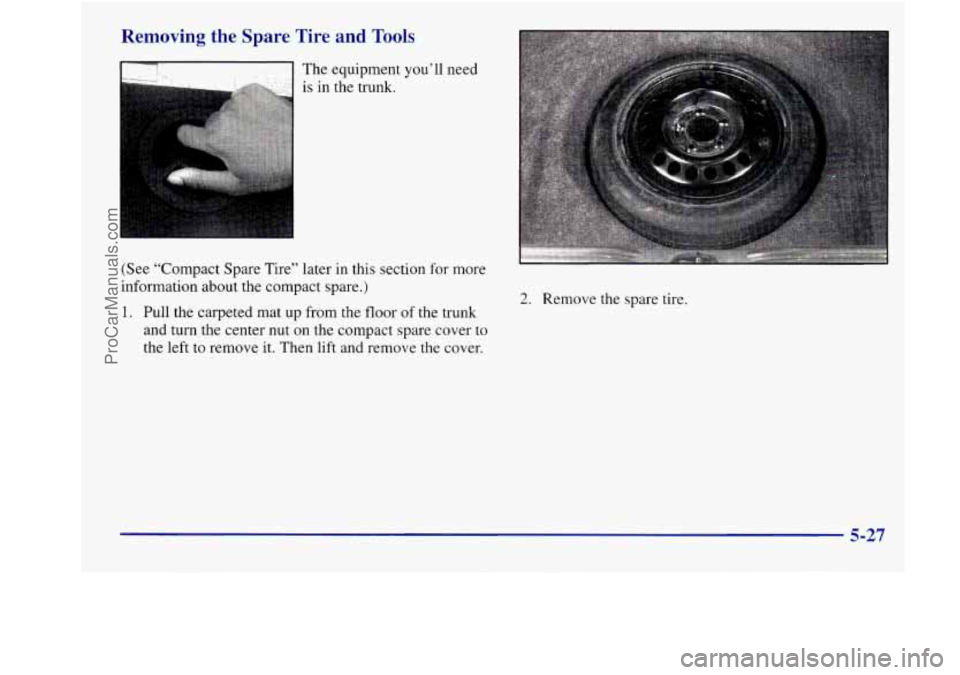
Removing the Spare Tire and Tools
(See “Compact Spare Tire” later in this section for more
information about the compact spare.)
1. Pull the carpeted mat up from the floor of the trunk
and turn the center nut
on the compact spare cover to
the left to remove it. Then lift and remove the cover.
2. Remove the spare tire.
5-27
ProCarManuals.com
Page 254 of 388
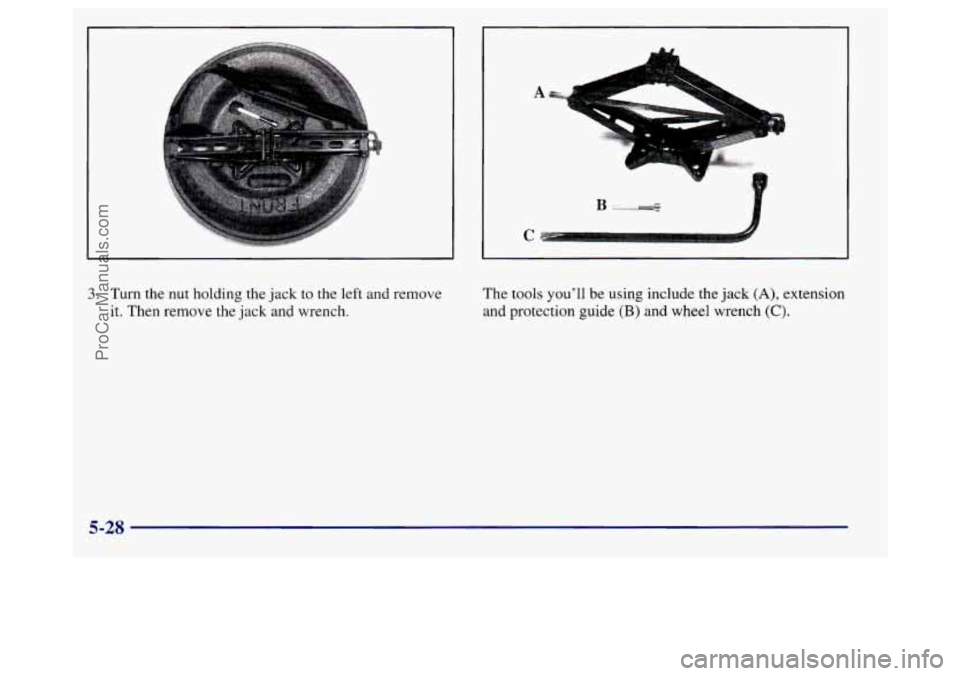
A
3. Turn the nut holding the jack to the left and remove
it. Then remove the jack and wrench. The tools you’ll
be using include the jack (A), extension
and protection guide (B) and wheel wrench (C).
5-28
ProCarManuals.com
Page 255 of 388
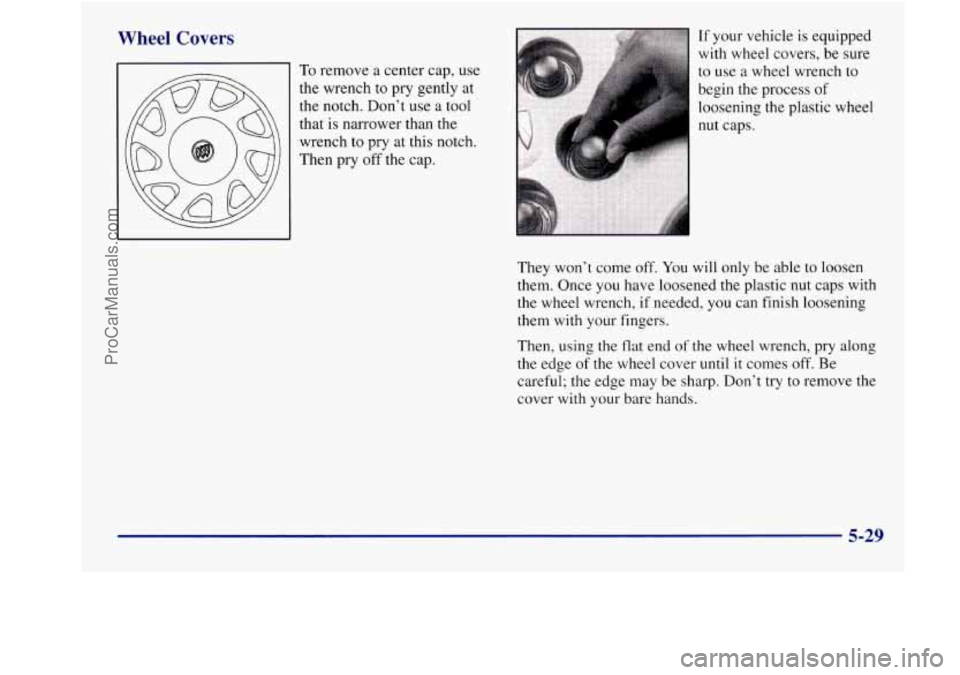
Wheel Covers
To remove a center cap, use
the wrench to pry gently at
the notch. Don’t use a tool
that is narrower than the
wrench
to pry at this notch.
Then pry off the cap. If
your vehicle is equipped
with wheel covers, be sure
to use a wheel wrench to
begin the process
of
loosening the plastic wheel
nut caps.
They won’t come off. You will only be able to loosen
them. Once you have loosened the plastic nut caps with
the wheel wrench, if needed, you can finish loosening
them with your fingers.
Then, using the flat end
of the wheel wrench, pry along
the edge of the wheel cover until
it comes off. Be
careful; the edge may be sharp. Don’t try to remove the
cover with your bare hands.
5-29
ProCarManuals.com
Page 256 of 388
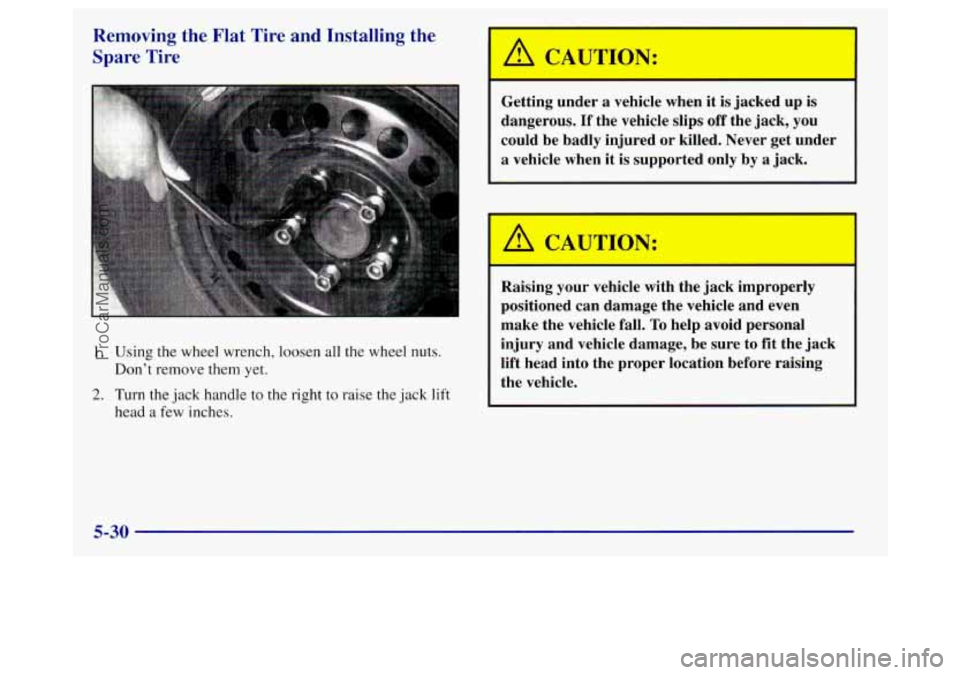
Removing the Flat Tire and Installing the
Spare Tire
Getting under a vehicle when it is jacked up is
dangerous. If the vehicle slips
off the jack, you
could be badly injured or killed. Never get under
a vehicle when it is supported only by a jack.
1. Using the wheel wrench, loosen all the wheel nuts.
2. Turn the jack handle to the right to raise the jack lift
Don’t remove them yet.
head
a few inches.
I A CAUTION:
Raising your vehicle with the jack improperly
positioned can damage the vehicle and even
make the vehicle fall.
To help avoid personal
injury and vehicle damage, be sure to
fit the jack
lift head into the proper location before raising
the vehicle.
5-30
ProCarManuals.com
Page 257 of 388
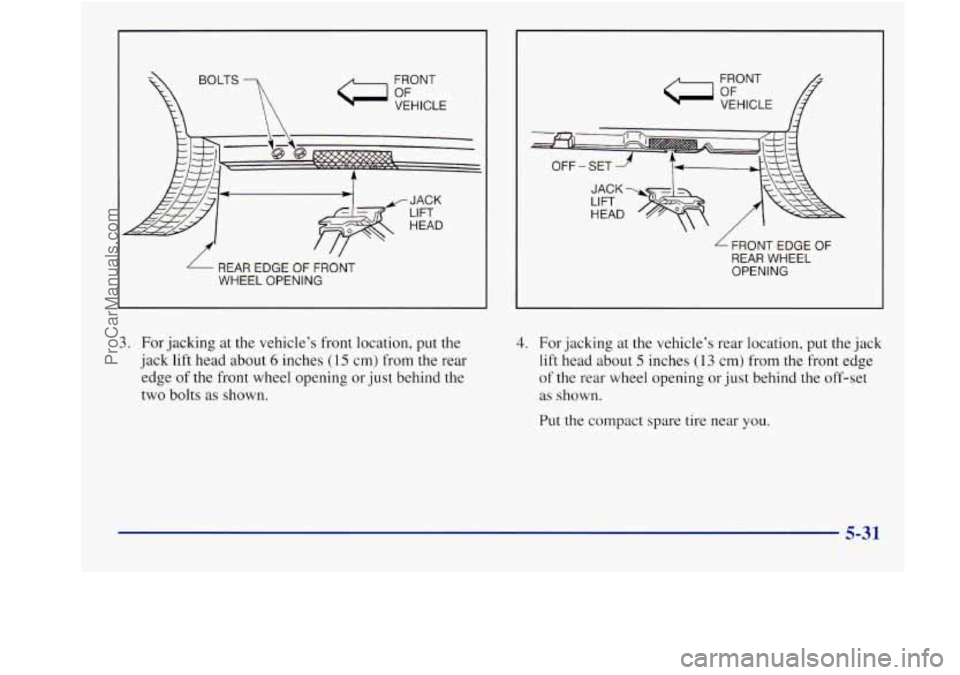
FRONT VEHICLE
\ \
- REAR EDGE OF FRONT
WHEEL OPENING
3. For jacking at the vehicle’s front location, put the
jack lift head about
6 inches (1 5 cm) from the rear
edge of the front wheel opening or just behind the
two bolts as shown.
FRONT EDGE OF
REAR WHEEL
OPENING
4. For jacking at the vehicle’s rear location, put the jack
lift head about
5 inches (13 em) from the front edge
of the rear wheel opening or just behind the off-set
as shown.
Put the compact spare tire near
you.
5-31
ProCarManuals.com
Page 258 of 388
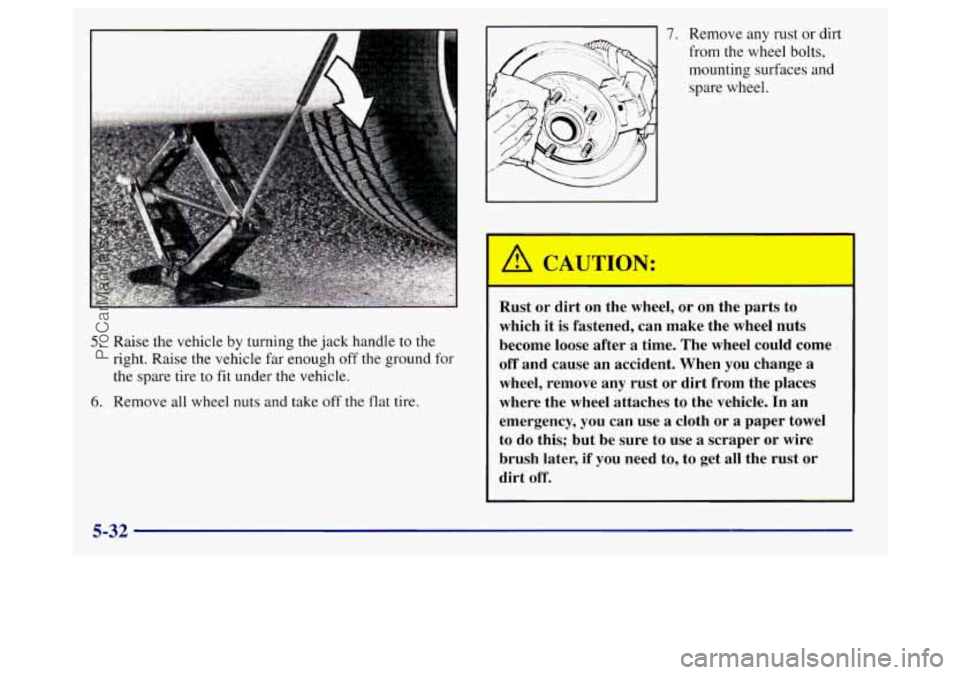
5. Raise the vehicle by turning the jack handle to the
right. Raise the vehicle far enough off the ground for
the spare tire to fit under the vehicle.
6. Remove all wheel nuts and take off the flat tire.
7. Remove any rust or dirt
from the wheel bolts,
mounting surfaces and
spare wheel.
A CAUTION:
Rust or dirt on the wheel, or on the parts to
which it is fastened, can make the wheel nuts
become loose after a time. The wheel could come
off and cause an accident. When you change a
wheel, remove any rust or dirt from the places
where the wheel attaches to the vehicle. In an
emergency, you can use a cloth or
a paper towel
to do this; but be sure to use a scraper or wire
brush later, if you need to, to get all the rust or
dirt off.
5-32
ProCarManuals.com
Page 259 of 388
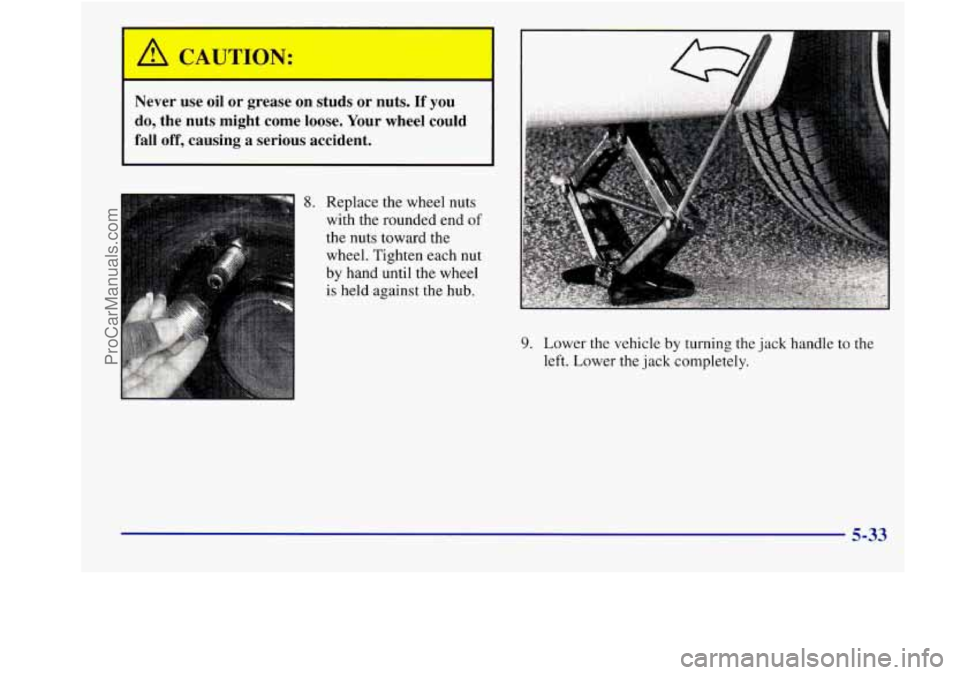
I A CAUTION:
Never use oil or grease on studs or nuts. If you
do, the nuts might come loose. Your wheel could
fall off, causing
a serious accident.
Replace the wheel nuts
with the rounded end
of
the nuts toward the
wheel. Tighten each nut
by hand until the wheel
is held against the hub.
9. Lower the vehicle by turning the jack handle to the
left. Lower the jack completely.
5-33
ProCarManuals.com
Page 260 of 388
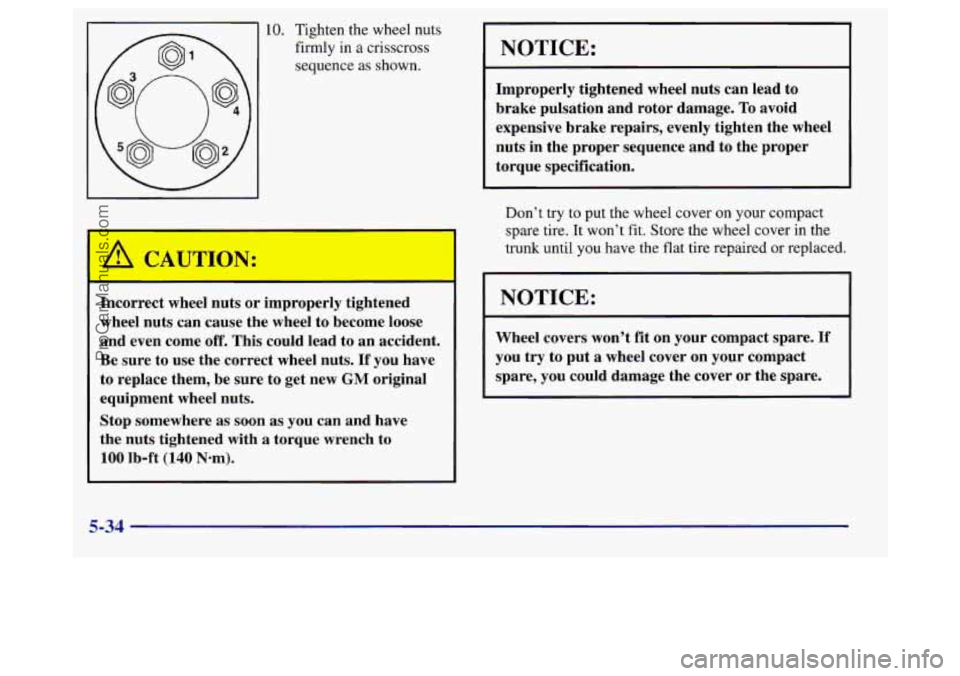
10. Tighten the wheel nuts
firmly in a crisscross
sequence as shown.
/!1 CA’, TION:
Incorrect wheel nuts or improperly tightened
wheel nuts can cause the wheel to become loose
and even come
off. This could lead to an accident.
Be sure to use the correct wheel nuts.
If you have
to replace them, be sure to get new
GM original
equipment wheel nuts.
Stop somewhere as soon as you can and have
the nuts tightened with
a torque wrench to
100 Ib-ft (140 Nom).
NOTICE:
Improperly tightened wheel nuts can lead to
brake pulsation and rotor damage. To avoid
expensive brake repairs, evenly tighten the wheel
nuts in the proper sequence and to the proper
torque specification.
Don’t try to put the wheel cover
on your compact
spare tire. It won’t fit. Store the wheel cover in the
trunk until you have the flat tire repaired
or replaced.
NOTICE:
Wheel covers won’t fit on your compact spare. If
you try to put a wheel cover on your compact
spare, you could damage the cover or the spare.
5-34
ProCarManuals.com